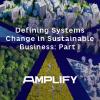The Sustainability Imperative
As organizations struggle to define a strategy that balances purpose and profit, opportunities are increasingly emerging to take the lead in sustainability initiatives. Front-line advances in areas such as net-zero emissions, AI-powered solutions for the underserved, precision agriculture, digital healthcare, and more are delivering business benefits, while simultaneously contributing to the realization of the UN’s 17 SDGs. We provide the expert thinking, debate, and guidance to help your organization reposition and transform in the era of sustainability.
Recently Published
The authors examine the beliefs driving the dominant capitalist and democratic systems that govern the West. They believe we need to change the way we think to imagine a future where all life flourishes. For them, social transformation must be at the scale of previous transformations like the Enlightenment and the Scientific Revolution. Accomplishing this will require change across many social systems, but the authors target one in particular: MBA programs. The authors opine that business schools must ground MBA programs in the liberal arts and science traditions of the great medieval universities while challenging students to approach their work as a calling and using organizational methods and resources to create values-driven, society-scale change.
John R. Ehrenfeld looks to the present model of the brain, in which fundamental rationality is taken for granted, and asks if the answer to the need for systems change lies in the ways the human brain works. This argument raises provocative and (perhaps) discouraging implications. If our economic, social, and political systems reflect the biological structure and function of the brain, what is the potential for changing those systems? Does systems change require fundamental change to cognition, and, if yes, how might that be accomplished? What are the ethical implications of equating systems outside the body with systems inside the body, given the apparent diversity of human thought and behavior? Do we risk valuing one way of thinking over others? If yes, will the privileged group occupying positions of political power decide system structure and function?
This first of two Amplify issues probes the necessary scope and scale of systemic solutions. What does systems change mean? What systems need to change, and how? Which possible future world do we want, which do we need? How can markets deliver such change?
The authors conclude this issue of Amplify by analyzing systems for governing greenhouse gas (GHG) emissions in markets in the US. They argue that public-private partnerships (PPPs) have the potential to fill the void in market governance left by the failure of the government to enact comprehensive climate change legislation. The authors highlight the Science Based Targets initiative (SBTi) as a tool that provides companies and other organizations with the means to make specific, credible plans to achieve decarbonization. They argue that aligning PPPs with SBTi target setting would be an effective mechanism to accelerate carbon emissions reductions.
For Earth Day 2022, let’s examine the climate and environmental risks and challenges facing us and how we can help address them and regain the glory of the Earth and the environment on which we largely depend. While there are amazing ongoing efforts, much more needs to be done by each one of us, including businesses, governments, and regulatory agencies.
By equating sustainability with the reduction of the negative externalities of our industrial processes, ultimately we are assigning environmental responsibility based on a company’s processes. This is meaningful if you are working in the making, moving, or mining of things, but less so if you operate outside of those industries. Thus, we need a new sustainability target that does not limit our collective responsibility to the boundaries of our organizations, as carbon footprinting does, but considers the boundaries of employee consumption.
As we explore in this Advisor, the global sustainability landscape is constantly evolving, with some governments and multinational companies leading the way to generate real business advantage. On the other hand, there is evidence that poor sustainability performance is becoming very costly, and proposed regulations will potentially make it more so.
CIOs and CTOs must steer their organizations toward the right technology portfolio to effectively realize sustainable business models while generating value for stakeholders. Their role in continuously assessing, designing, and implementing sustainable business models by engaging effectively in a sustainable business model canvas can ensure a future-fit business, which will take organizations closer to a zero or negative impact on socio-ecological systems.
























